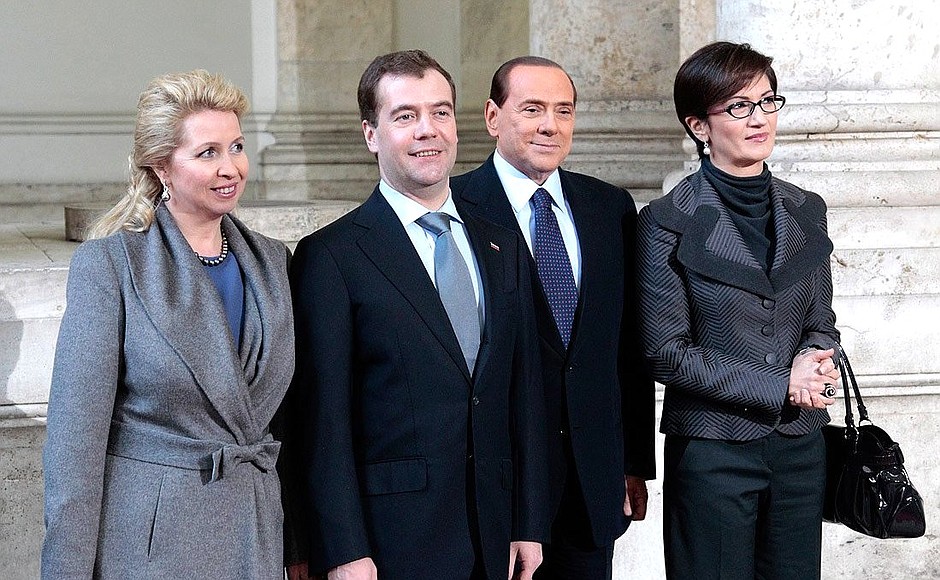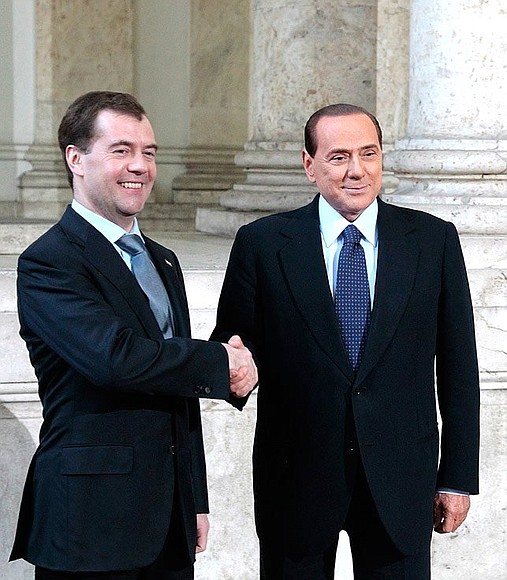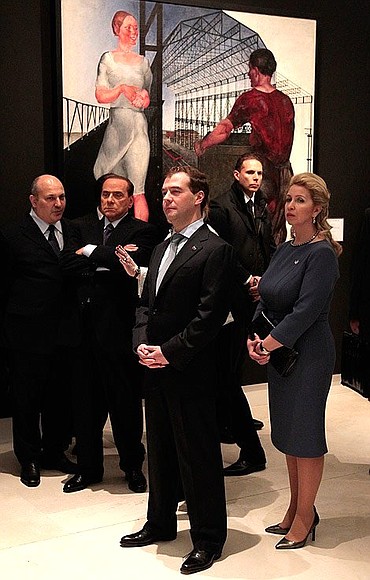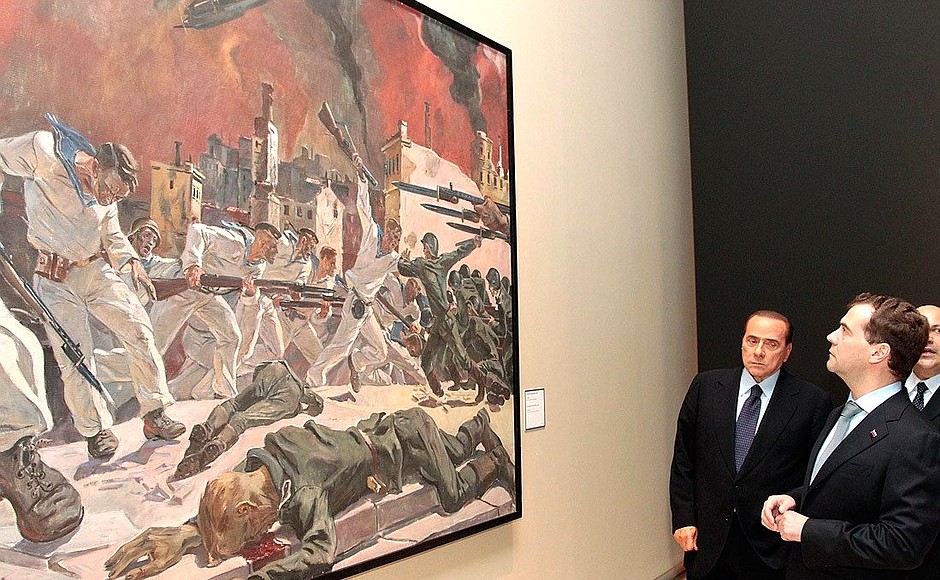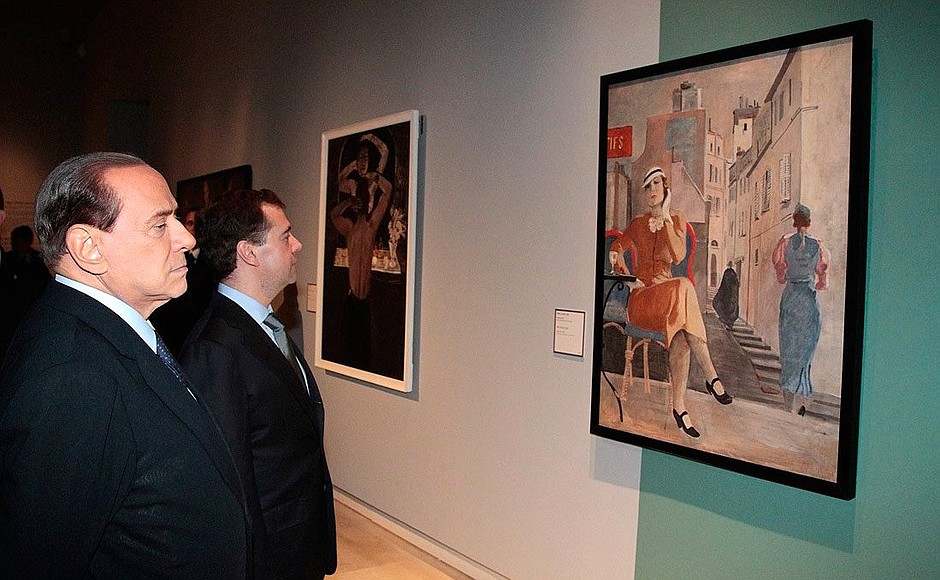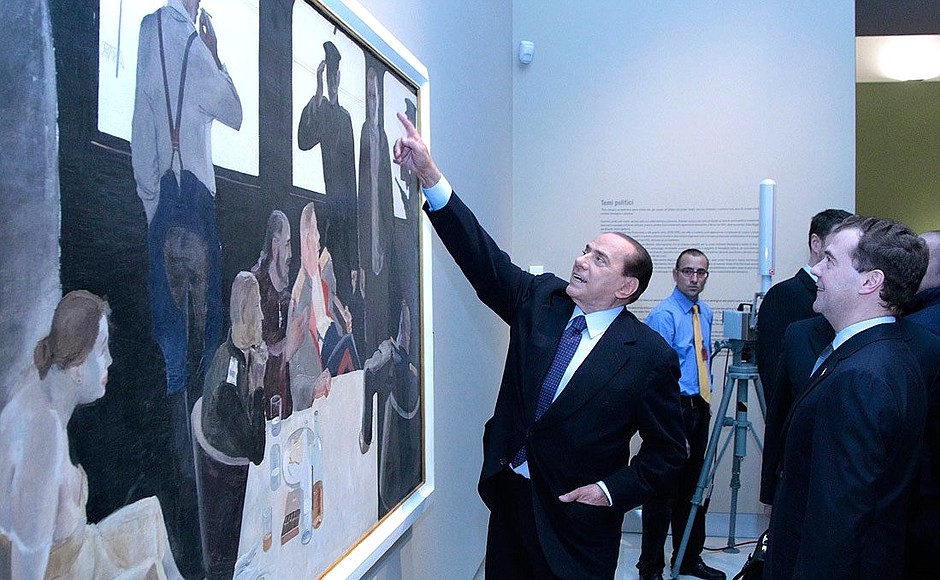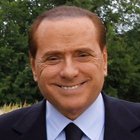The cultural project will include exhibitions, theatre festivals, concerts, and meetings with writers and linguists.
The first Year of Russia in Italy event was the opening of a major exhibition of works by artist Alexander Deineka (1899–1969) from the State Tretyakov Gallery (Moscow) and the Russian Museum (St Petersburg). When visiting the exhibition, Dmitry and Svetlana Medvedev were accompanied by Silvio Berlusconi.
* * *
Prime Minister of Italy Silvio Berlusconi (retranslated): Hello, everyone,
It is with great warmth that I would like to welcome President of the Russian Federation Dmitry Medvedev and his wife, who have granted us the great honour of visiting us on this occasion, which is very important to us. Today, we are triumphantly launching the Year of Russian Language and Culture in Italy and the Year of Italian Language and Culture in Russia.
Our nations have very friendly relations at the political, economic and commercial level. We are, first and foremost, two cultural superpowers. And I think that this eventful year will render our relations and our friendship even closer.
Many events will take place, beginning today: over two hundred, with a hundred in Russia and a hundred in Italy. Italian events in Russia will be spread over more than 30 cities throughout Russia’s vast territory – which is 56 times greater than that of Italy. Various Russian cultural events will be held in Italy as well, in both large and small cities – in the cities of the north, centre and south, involving over 50 state and private organisations.
I would like to thank all the representatives of these organisations, who will also join us tonight for dinner at Villa Madama.
We will send rare Botticelli and Caravaggio paintings to Russia, to the Pushkin Museum, the Kremlin Museum, and the Hermitage in St Petersburg. And here, in Florence, we will be displaying treasures from the Kremlin.
There will be concerts by very prestigious Italian orchestras, an opera production of Nebuchadnezzar conducted by Maestro Muti, Verdi’s requiem will be performed in Moscow, and the Italian theatre will tour various Russian cities. Italy will play the lead at the book fair to be held in Moscow, and Russia will be an honoured guest at the book fair in Turin. There will be many joint events held by universities and schools.
I think that we will also have a great deal of success in holding sporting events. We have a major programme planned in a variety of sports, including synchronised swimming.
We also decided to present the ‘Made in Italy’ designs, technology and innovations. More than 200 Italian companies will come to Russia to present their achievements in a wide variety of sectors, including in research and medical sector – achievements that have truly turned our nation into its own kind of landmark, including in the field of education for foreigners. We are united with Russia through very close strategic cooperation and partnership upheld by the many Italian companies working in Russia, important Russian investments in Italy, and some very close political relations between the two nations’ leaders.
I have long-standing relations with Prime Minister Vladimir Putin and close, tight relations with Dmitry Medvedev. I hope that you really see us as your friend in the European Union. I personally oversaw all the relations that the European Union develops and will develop with the Russian Federation. The Russian Federation is the world’s most important oil and gas exporter. And naturally, Russia is interested in Europe, because it is a very important market for Russia.
On the other hand, Europe and Italy particularly need Russian gas and oil, which currently covers about one third of our gas and oil needs. Thus, in addition to the reasons I mentioned earlier, we also have specific economic reasons for cooperating. I would like to thank President Medvedev and his wife for coming here.
We will be together in the evening as well, and we will have the opportunity to talk about all the events that will be held in Italy and in Russia. We will have the chance to truly celebrate our friendship in the best possible way, also addressing the problems and concerns we have in connection with the events unfolding around the world – for example, the events in the Maghreb region – we will have that opportunity. Thus, I want to once again thank my friend Dmitry from the bottom of my heart.
President of Russia Dmitry Medvedev: Mr Prime Minister, dear Silvio,
Ladies and gentlemen, friends,
We are launching the Year of Russian Culture and Language in Italy and the Year of Italian Culture and Language in Russia. We are launching it here in Rome. Mr Prime Minister just described in detail the cultural exchanges that will occur.
But in speaking about language, I have a feeling that perhaps we do not even need to make any special efforts. Judging by the fact that the Russian delegation did not use their headsets during the Prime Minister’s speech, we could conclude that nearly all of us in Russia understand Italian. This is very good, absolutely excellent.
To be more specific, according to our linguists’ estimates, there are 40 to 45 thousand people in Russia studying the Italian language – it would seem this includes officials in the Government and the Presidential Executive Office – and some 30 thousand Italians who study the Russian language. This will certainly help our communication – and this communication and these relations are excellent.
Mr Prime Minister just said that we are launching a cultural project unprecedented in its scope and mentioned there would be 300 events. My information differs and it seems that Russia uses bigger figures, because according to my data, there will be 500 events, therefore 200 must have gotten lost somewhere. But apparently, these must be smaller events, or perhaps they appeared on the agenda at the last minute. In any case, 300 is a good number, and 500 is even better, because our nations are truly close when it comes to culture.
During a certain period in time, Italian culture played an extraordinary role in shaping Russian classical culture as Italy was frequented by our writers, artists and poets. Incidentally, even the fact that the Year of Russian Culture is beginning with an exhibition of Alexander Deineka’s paintings is also likely no accident. He is a Soviet-era artist who mainly painted during the Soviet period, but nevertheless, his works, even during these times which were anything but simple, were influenced enormously by Italian culture and perhaps that is precisely why we can see in them both processes that were occurring in our country during a troublesome period of its history, and a serious influence by Italian culture.
Italy is justly considered a treasure trove of European civilisation. Italy has always had a special attitude toward culture and art. The great spirit of renaissance has traditionally nourished a huge number of people of arts who came here. As I already said, since the 18th century many Russian writers, poets, musicians and painters came here and their experience gave tremendous momentum to the development of Russian culture. Many of our geniuses lived here for years, including Fyodor Dostoyevsky, Nikolai Gogol, Pyotr Tchaikovsky, Sergei Prokofiev, Andrei Tarkovsky and Joseph Brodsky, and I am certain that future generations of Russian artists, writers and poets will be inspired not only by their own country, but by the wonderful landscapes and architectural monuments of Italy as well.
Indeed, our nations have a great deal in common, including openness, kindness, sociability, the emotionality inherent to our peoples, and receptiveness to all that is new. Thus, I hope that this major cultural project will boost our relations and will advance them in areas aside from just business contacts. And this is very important – I absolutely agree with what Mr Prime Minister said. No doubt, our business ties are strategic in nature, but the humanitarian component is no less important and it has always been strong. It was strong in the 18th and especially the 19th century, as well as in the 20th century. I hope that the humanitarian component will shape the face of our cooperation into the 21st century too.
I would like for everything happening this year to truly be very interesting for our people. They will be able to learn about the wonderful works of Italian art, both by visiting Italy itself and through television and other media in Russia. I hope that the same will happen in respect of Russia where we are always happy to see our friends from Italy, who visit our museums, theatres and concert halls. In general, these intensive contacts are very important as they promote a distinctive harmony in relationships between our people, and therefore, between our nations.
It is a pleasure for me to participate in this ceremony today and I would like to thank my Italian friends, including Silvio personally, for the input you made into launching these events. I would like to express gratitude to all the bodies that helped organise these events here and elsewhere.
Overall, we are happy that we are participating in the opening of the Year of Russian Culture in Italy and Year of Italian Culture in Russia. I would like to wish everyone here interesting explorations and success this year.
